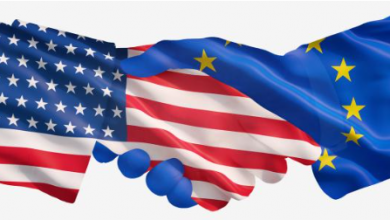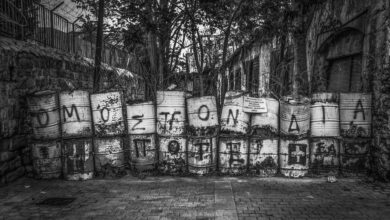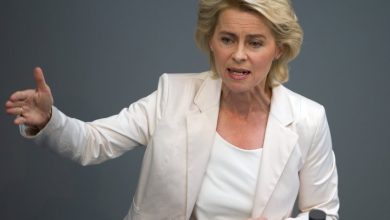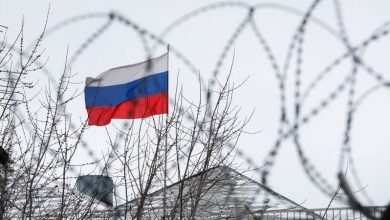Why We Shouldn’t Let Turkey Get Away with Invading Northern Syria

Following the US decision of retiring its armed forces from Northern Syria, Turkey has seized the opportunity and, at time of writing, has launched an invasion of the largely Kurdish inhabited area of Rojava. Autonomous Kurdish forces in the region gained notoriety with their fight against ISIS, reaching worldwide fame during the battle for Kobane, a town on the border between Syria and Turkey. Erdogan’s country, long engulfed in a deadly war against the Kurdish insurgents on its own territory, has accused Syrian Kurds of supporting the insurgents.
The Kurdish Workers’ Party (PKK), the prime initiator behind the Kurdish insurrection against Istanbul of 1984, is listed as a terrorist organisation by numerous Western countries, some of which nevertheless supported Iraqi and Syrian Kurds. Erdogan’s party originally came to power also thanks to promises of reconciliation with the Kurds, and won American and British support exactly in this light. The promises however have consistently failed to materialise. Erdogan’s turn to authoritarianism further hampered peace talks, both with the Kurds and in Syria.
Turkey has already conducted vicious air raids in Northern Syria in the past, and new air strikes have been launched today, as much as fifty kilometres deep into Syrian territory. It is widely expected that this will only serve as the preliminary stage to a large-scale invasion by Turkey and the Syrian rebels it backs, an operation which Ankara has codenamed “Spring of Peace”. The likely objective of this invasion is the creation of a “buffer zone”, which would prove immensely harmful to an already unstable geopolitical and social order in the region.
A single nation, different factions
It’s well known that the Kurds, a large national community split between Southeastern Turkey, Northeatestern Syria, Northern Iraq and Northwestern Iran, decisively endorse the call for independence or at least autonomy within the countries they are actually living in. The fame they gained with their fierce fight against ISIS in Syria and Iraq has also resulted in greater international support for the Kurds’ plight. Western public opinion is considerably more informed today regarding the different factions and parties that make up the Kurdish political landscape. The Turkish PKK was already widely known, and didn’t enjoy a good reputation with moderate circles, to the benefit of the law-abiding Peoples’ Democratic Party (HDP). Iraqi and Syrian organisations, however, rarely gained the spotlight.
In Iraq, the Kurds enjoy a greater autonomy due to the federal structure of the country, and have enjoyed American support since the war against Saddam Hussein, who was responsible for a brutal oppression against that minority. The political landscape there is dominated by the Democratic Party of Kurdistan (DPK) and the Patriotic Union of Kurdistan (UPK), whose militias, the Peshmergas, constituted an independent armed force to help local government in the fight against ISIS. This was no easy feat: collaboration was hampered by past and present disputed that even resulted in internecine fights between the ruling DPK and the UPK, or the PKK.
In Syria, Kurdish political parties such as the Democratic Union Party (PYD) have been eclipsed by the People’s Protection Units, the YPG. Born as a military branch of the Democratic Union Party, the YPG grew in numbers and became the main component of the Syrian Democratic Forces, fighting mainly against the Islamic State. Famous mostly due to the siege of Kobane, and the all-female military units fighting alongside it (the YPJ), the People’s Protection Units loom large over Rojavan politics because of the local instability in the chaotic frame of the Syrian civil war. Ankara accuses the YPG and Syrian Kurds of supporting the PKK’s terrorist activities in Turkey.

The main rift: Iraqi Kurds and the PKK
The parties and organisations cited so far are ramifications of what is, fundamentally, a two-way split. The ruling Iraqi Democratic Party of Kurdistan seems to be adverse to other Kurdish independentist movements, and is reluctant in giving support to the Syrian and Turkish Kurds in particular.
Due to the oil endowements of Iraqi Kurdistan, as well as its relative autonomy, DPK’s politicians seem more interested in strenghtening their regional power, rather than becoming the champions of Kurdish Independence. It’s significant that Iraqi Kurdistan voted in a referendum on its independence from Iraq in 2017, and the independence proposal was limited to Iraqi Kurdistan alone. While this does not entirely rule out support for the formation of a pan-Kurd nation state in general, which is likely widespread, it does emphasise that there is little political will to take the lead.
Northern Iraq is also home to PKK bases, acting as a safe haven from Turkish retaillations until August 2011, when the Turkish air force violated Iraqi airspace and bombed PKK positions. The PKK itself is struggling to maintain a relevant role in the region: the never-ending succession of ceasefires and attacks, as well as mutual accusations between the insurgents and Turkish authorities, has not been beneficial to the PKK. Its “mythical” image as the vanguard of an oppressed people has been irremediably damaged, although Turkey’s authoritarian turn under Erdogan’s rule may have regained it some sympathies.
Syria and the YPG: a chance for democracy
The PKK’s niche in Syria is the domain of the YPG, and Turkey certainly shares this belief, but any comparison between the two organisations should be made with caution. Although the reputation of the People’s Protection Units in European and Western public discourse has garnered a lot of support, we should refrain from being overly enthusiastic about them. At the same time, they are clearly very different from the PKK. Unlike the latter, the YPG is more than just an insurgent group: it’s the backbone of the resistance conducted by democratic forces in Syria against both Islamic extremists and Assad’s regime, fighting alongside Arabs and Assyrians alike.
Turkey is not the only entity critical of the YPG: Amnesty International accused them of both ethnic cleansing and forceful displacement. For what it counts in such a messy situation as the Syrian civil conflict, a U.N. Independent Commission refuted the first claim, and the second one can too be countered arguing the military necessities of displacing people in conflict areas regardless of their ethnicity.
The point is that, considering the chaos of civil war, the experience of Rojava seems to be not just the most democratic one, but also a political laboratory due to the attempt at translating the ideas of “democratic confederalism” into a viable polity. This ideology has been elaborated by Abdullah Öcalan, PKK founder and leader, who moved from former Marxist postions to those of the libertarian Murray Boockchin. Öcalan’s interpretation of Boockchin’s theories embraces numerous libertarian principles as well as feminism and ecologist values, insisting on the people’s right of self determination and on the importance of direct democracy and municipal autonomy. Rojava’s Charter of the Social Contract, adopted as a provisional constitution in Northeastern Syria in 2014, affirms the principles of Democratic Confederalism and grants protections to minorities. This provisional constitution comes short of declaring independence from Syria, but speculates its future evolution as a federal State.

Why Europe should care about Northern Syria
At a time when Turkey looks firmly grasped in Erdogan’s hands and Assad is winning the civil war, Rojava is besieged on all sides. Cruelly abandoned, it will not stand a chance against the invasion currently under way. Instead of bystanding, the EU should step into the breach left by the United States and take on a leading role in assuring that the area experiences true democratisation.
It’s not just a matter of promotion of democratic values, something the EU should be committed to, especially regarding countries that are part of the European Neighbourhood Policy, such as Syria, or the EU enlargement Agenda, such as Turkey. This is also a matter of both European security and image. As we have emphasised, Syrian Kurds have been the main force on the field in the fight against ISIS, and the defeat of the latter is cited as the reason for US withdrawal from the area.
Not only this is a questionable choice from a military perspective, for the end of ISIS as a territorial entity doesn’t mean its disappearance as a terrorist menace that must be eradicated, but it’s also a clear refusal to engage in the protection of peace and human rights in the area. The early argument that Erdogan and Assad had peaceful intentions regarding Rojava was already shaky, given Erdogan’s track record of launching military operations in the Middle East, and Assad’s stated intent of drowning opposition to his rule in a sea of blood.
Now that Turkey has indeed undertaken its invasion, that weak argument has fully collapsed. Why should the EU follow Trump in abandoning its former allies, acting itself as yet another opportunistic bystander? Why should it risk for numerous European foreign fighters to escape Kurdish prisons and potentially conduct attacks on European soil?
What should the EU do?
The EU has already demonstrated its ability to punish foreign adventurism. Its biggest problem with any strategy curtailing Turkish actions, however, is that of the migration-bomb Ankara holds in its hands: hundreds of thousands of potential immigrants are now forcefully prevented from crossing Turkey into the EU. Should Turkey allow its border controls to lapse, this would create a scenario similar, when not more tragic, to what happened on the so called “Balkan Route” in 2015. In a European political environment where the wells of the immigration debate are well and truly poisoned, such a new wave could be fatal in the struggle against right wing euroscepticism. How could the EU face such a challenge? Only through an EU based policy on migration.
Another matter is that of divergent economic and geopolitical interests of the Member States, limiting the successful implementation of the EU’s common foreign and security policy. Nonetheless, having the Kurds as allies in the Middle East would benefit everybody. Inaction would mean that Russia, Turkey and Iran would gain a greater control, excluding any European player. Acting together would counter this scenario and strenghten the image of a “more united Union”. Another obvious step to ensure that the European Union can assert his role as a global stakeholder would be that of a greater military cooperation. Things are already getting serious on defence integration, but the best would be for the EU to increase its role as an unitary peacekeeping force in the UN.
All of this, as of today, seems nearly impossible to achieve. The truth is that the European Union can’t do much to effectively oppose Erdogan’s undertaking. Ultimately, the Middle East is a hard power arena where armies, aircraft and navies count far more than anything else. The EU is uniquely unsuited to intervene because it lacks critical assets. Maybe Rojava is doomed. If that is so, then this loss, this further failure of European foreign policy, this additional humiliation suffered at the hands of the Turkish “Sultan”, must be a definite wake-up call.
The European Union must have its own defence capabilities and the mandate to use it. This will not be a quick process, but that only means we have no more time to lose, and Europeans need to wake up to the realities of the dangerous international community we now live in. Enough with being taught lessons from dictators and authoritarian governments. Enough with inaction. The High Representative for Foreign Affairs, Federica Mogherini, already denounced Turkish aggression as deleterious to the peace process in Syria: will action follow, or will myopic inaction continue to dominate European political culture?






Turkey is trying to resettle SYRIAN refugees who YPG and Assad forced them to leave those lands. How come this can be invasion? YPG carried bombing attacks to Turkey with suicide bomber like ISIS. Should be Turkey protecting its citizens? YPG burned Turkish forests, attacked touristic cites and put mines into civilian areas. Anyone can easily find these news online. Besides, what you suggesting is dividing Syria and giving their lands to some other people to create their own country. How there will be a democratic resolution with this approach? In my opinion, you should do more research and read loudly to hear what you wrote before publishing. Cheers